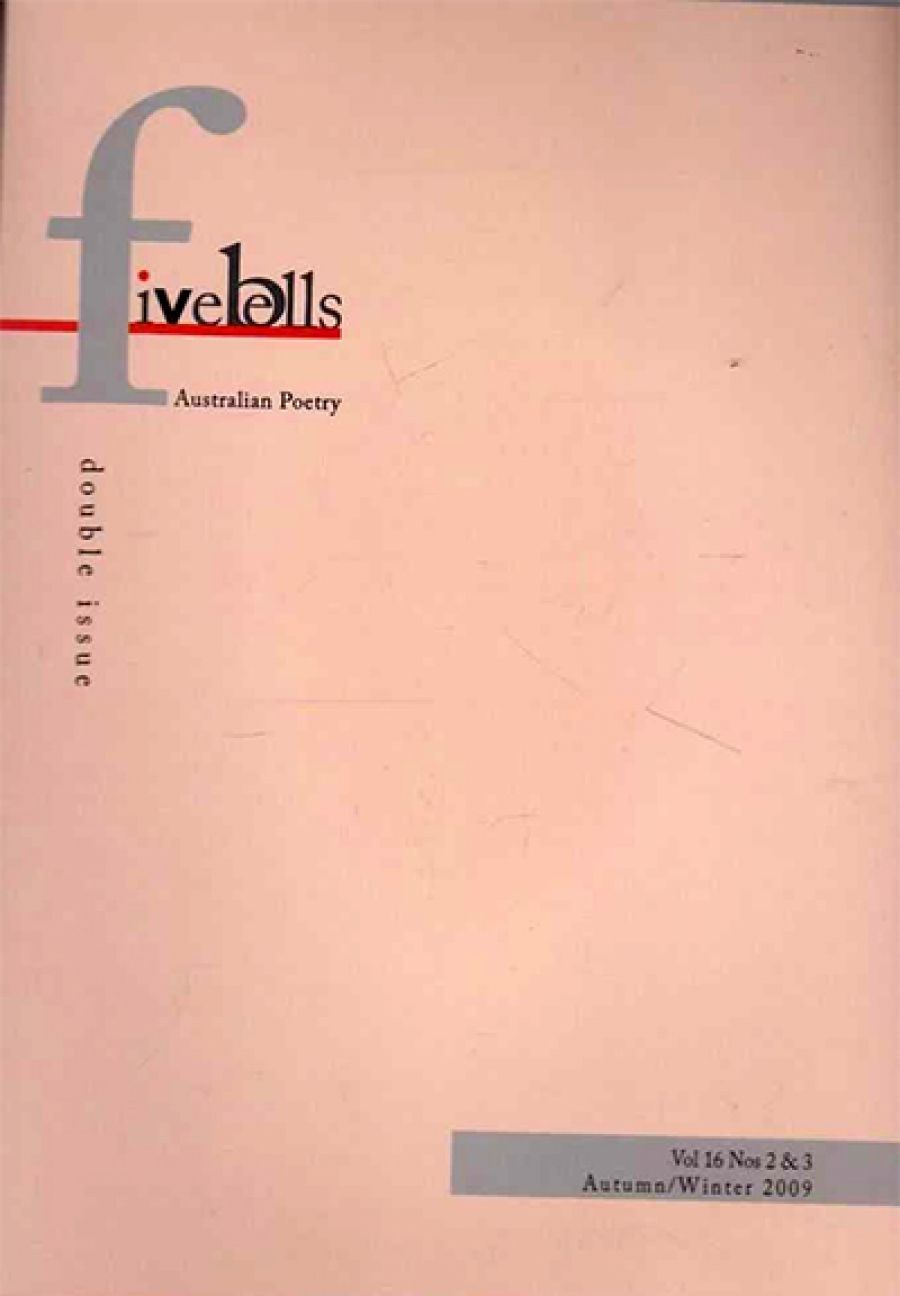
- Free Article: No
- Contents Category: Poetry
- Review Article: Yes
- Online Only: No
- Custom Highlight Text:
Along with regular features, this bumper edition of the Poets’ Union journal, Five Bells, includes the proceedings of festival discussions in Sydney, Melbourne, and Perth: sixteen strongly argued, well-crafted papers by some of Australia’s best poets, variously considering the state of Australian poetry now. For all the individual interest of these papers, this collection’s strength lies in the way they set up parallels and contradictions, working together like a long, amiable argument.
- Book 1 Title: Five Bells Australian Poetry Festival (Double Issue)
- Book 1 Biblio: Poets’ Union Inc., $20 pb, 168 pp
Lea’s paper establishes a factual background to the discussion. In fact, Lea’s essay is so strong it makes you wish some patron would commission a paper on the last hundred years in poetry publishing, a study that could assess the effect of marketing, for instance, and the machinations of the poetry world: salons, writing groups and factions. However, this edition keeps to current issues, and there are plenty of those.
In the main, the discussion turns on why poetry sales are low, and how Australian poetry’s marginal place affects the way poets write. As Mike Ladd notes in his tough-minded paper, ‘Poetry: Is There an Audience for It?’, his radio show, PoeticA, averages 90,000 listeners a week. Poetry festivals and writing courses are springing up everywhere, and John Tranter’s free online poetry magazine has recorded more than a million hits. Poetry is not so much unpopular as unprofitable.
Is it simply a question of marketing and distribution? Independent presses cannot afford to promote what they publish and, with the exception of Kris Hemensley’s Collected Works, most bookstores stock just a handful of poetry books, usually on some low back shelf. As Lea points out, ‘under these conditions the thus-far unchallenged maxim that “poetry doesn’t sell” becomes self-fulfilling prophesy’.
Is it the culture’s fault? In an impassioned and principled paper, Judith Beveridge argues: ‘the value of our poetry is that it is all the things the marketplace is not’:
I believe one of the primary reasons why poetry does not have a large audience is because as a society we don’t value our language. We see it as a means to an end. We distort and truncate it, we manipulate the life out of it. We forget that language is indeed an evolutionary force.
Martin Langford makes a similar point: ‘Rather than the child-like world of either-or identifications and of satisfying triumphs, [poetry] offers only the play and music of its undertakings. This is also what makes it so difficult to market …’
Our market-speak and local Pentagonese do bear a troubling resemblance to 1984. And yet, if Australian poetry takes its strength from its resistance to contemporary culture, it nonetheless takes much of its life from that culture, in the work of poets such as Gig Ryan, Ken Bolton, Pam Brown, Joanne Burns, Aidan Coleman, John Forbes, Michael Farrell and the guest editor of poetry in this edition of Five Bells, Hal Judge.
It is strange that poetry sales don’t typically vary, as fiction sales vary, across the field. Why don’t poets whose work has pacing and characterisation as strong as any in fiction – Lisa Bellear, Geoff Page, Craig Sherborne – have the readership of Tim Winton? Bruce Dawe has a paper on dramatic monologue, which illustrates the intelligence and accessibility of his poetry, and Ron Pretty quotes the poetry of Dennis McDermott, which should reach a wide audience: ‘a doctor’s daughter from Ingham or Innisfail, some sugar town, told me Queensland / houses on their skyscraper stilts were the perfect metaphor for non-Indigenous Australia’s / perch on the land …’
Of course, Dorothy Porter was the great exception to the poetry sales rule. She would perhaps have been pleased to see two kinds of tribute here: Kristin Henry’s obituary, everywhere sustained by true feeling; and Justin Clemens’s detailed and intelligent study of myth in Porter’s verse novel, Akhenaten.
In this essay, Clemens argues that Australian poetry takes its inventiveness from its impossible relationship to politics. He quotes Michael Dransfield: ‘to be a poet in Australia is the ultimate commitment.’ Along with David McCooey and Alison Croggon, Clemens notes a weird combination of Romanticism and nothingness in Australian poetry. In fact, these three papers make a kind of triptych: each a study of style, together they illustrate the widest variety of style, with Clemens anarchic and intricate, and McCooey generous and lucid, while Croggon’s essay takes a luminous quality from the poetry it cites, from Randolph Stow to Emma Lew.
As these essays suggest, the most gifted poets are also gifted readers. Several papers quote Peter Porter’s remark that ‘poetry is not a spectator sport’: most of the people who read poetry write it themselves. But do most of the people who write poetry read it? As Les Murray has pointed out elsewhere, the Australian Bureau of Statistics records 6000 Australians who note the writing of poetry as their chief hobby. Do they buy other poets’ books?
First given at festivals, all these papers keep the liveliness of face-to-face encounter and reflect each poet’s individual style. Perhaps the most anecdotal and fresh of these is Robert Gray’s paper, which starts: ‘I’ve decided I will try to think on my feet about this topic.’
Gray offers an insider’s view: with a combination of generosity and pragmatism, he assesses what poets can take from the range of poetry now. Gray’s paper ends with praise for the poet Philip Hodgins, who wrote this definition of a poem: ‘a beautiful object, perfectly useless of course / but something to take to the grave. To anyone’s grave.’


Comments powered by CComment